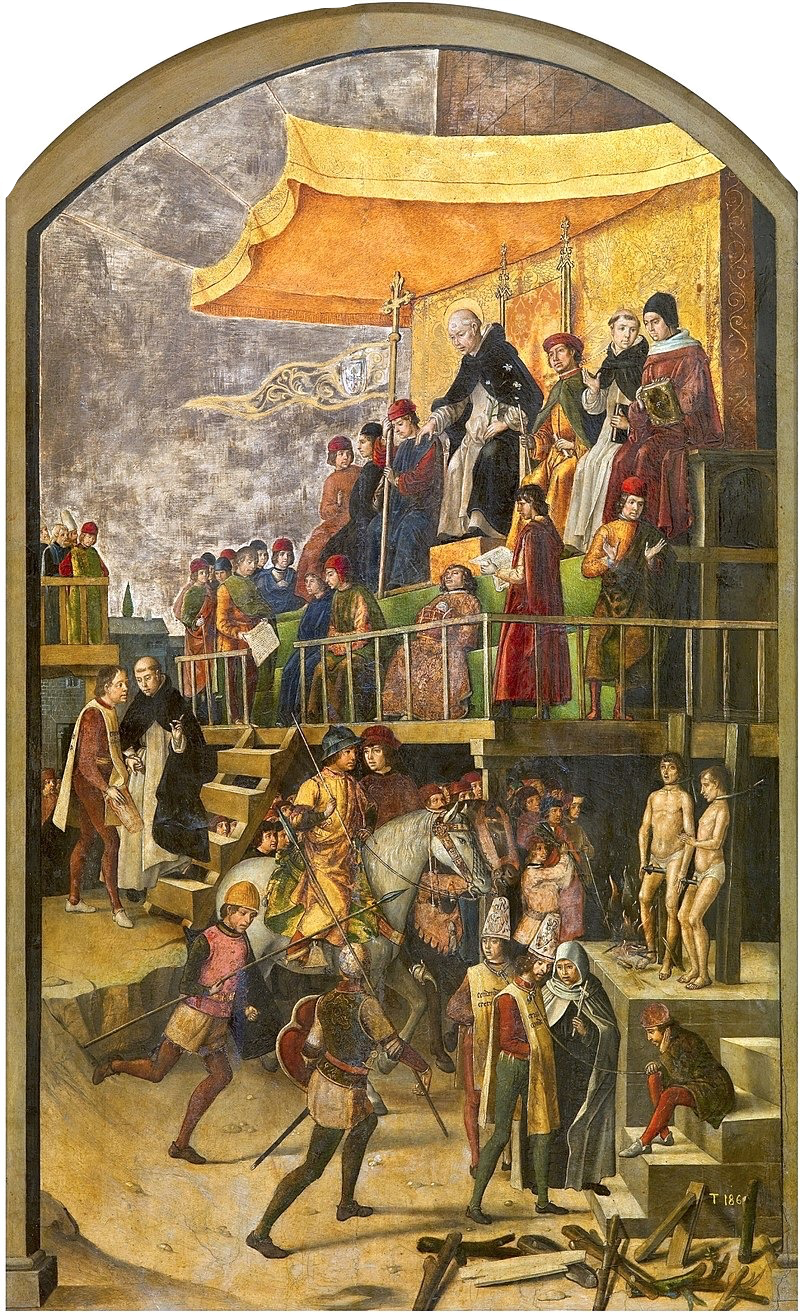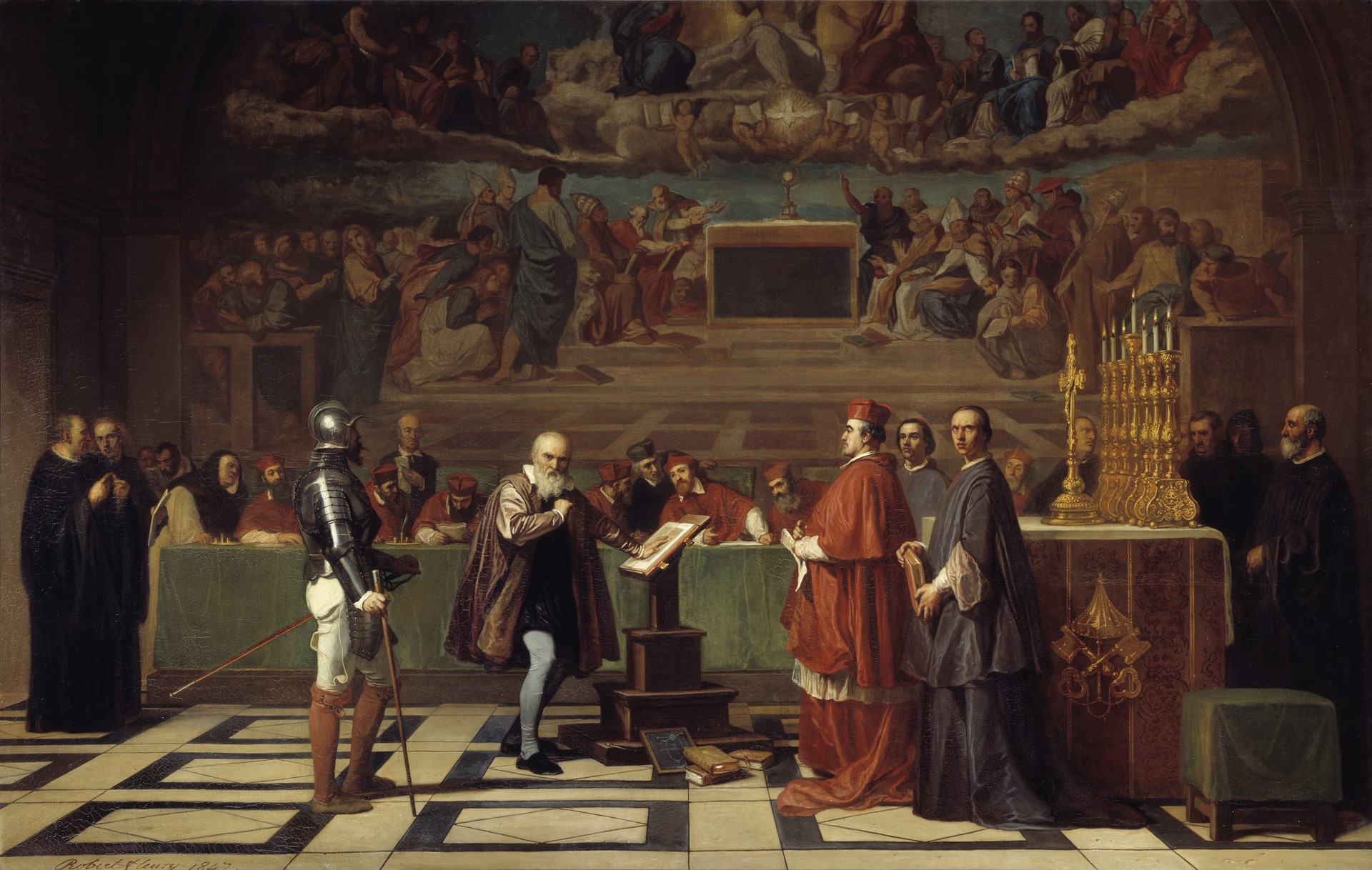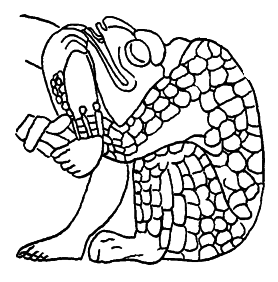異端審問について
On Inquisition (sancta inquisitio)

異端審問について
On Inquisition (sancta inquisitio)

池田光穂
異端審問とは日本語のウィ
キペディアでは「中世以降
のカトリック教会において正統信仰に反する教えを持つ(異端である)という疑いを受けた者を裁判するために設けられたシステム」とし「中世初期の異端審
問、スペイン異端審問、ローマの異端審問」をそれぞれ異質なものとして、分けて論じている。だが、これは司法裁判がおこなう判定のような中立的なものよう
に誤解を与える点で、カトリック教会中心の見方で、より客観的に言うと、異端審問は
「異端(heresy)」と戦う真理判定手段のことで
ある。つまり、平信徒は、自分が信仰していることが、正統なものなのか、異端なものなのか「無理解」であることを前提に、教会が特定のミッションをもっ
て、異端を摘発し——その審理のプロセスで個々の異端が具体例として示される——拷問と暴力をもって「異端と称されるもの」を弾劾、排除するものである。
その意味では、伝統社会における供儀儀礼と、異端審問は同じものであり、儀礼の目的は、宗教的な意味での「浄化」である。
★「異端審問(ラ
テン語の「調査」を意味するinquisitioに由来)
という用語は、中世後期から近世初期にかけて異端と戦うために用いられた法的手続き(異端審問手続き)と、それに関わる機関を指す。異端審問裁判所の議長
は異端審問官と呼ばれる。
13世紀初頭に創設されてから18世紀末に廃止されるまで、異端審問は主にローマ・カトリック教会が異端者の摘発、改宗、または有罪判決を促進するための
手段として機能していた。この目的のために、中世後期には新たな法手続きである異端審問手続きが開発された。異端審問の主な発展段階は13世紀前半に起
こった。当時定義されていた異端という罪に加え、異端審問は他の犯罪の起訴にも使用され、特に冒涜や魔術など信仰に関する問題に触れる場合にはそうであっ
た。異端審問は、主に世俗の支配者によって行われた近世の魔女狩りにおいては従属的な役割を果たした。教会は、異端審問を異端者に対して用いることは、聖
書や教会の権威ある文献を参照することで正当化されると考えていた。
中世の異端審問は、それ自体に包括的な権限を有していたわけではなく、恒常的に活動していたわけでもない。異端審問は教会が必要と判断し、条件が満たされ
た場所で実施された。そのため、異端審問は地域や時代によって異なり、特に南ヨーロッパや中央ヨーロッパで実施され、身分制度に基づく社会のさまざまな機
関によって支持された。尋問中の拷問の使用や、死刑の適用範囲も様々であった。教会による異端審問は主に司教や修道会のメンバーが主宰した。近世になると
異端審問の形態は変化し、スペイン、イタリア、ポルトガルで制度化され、国家機構に組み込まれた。それ以降、異端審問はほぼ専ら各国の支配者の権限の範囲
内で適用されるようになった。近世の初期には、プロテスタントも異端審問によって迫害された」(→「異端審問」より)
"Inquisitio
haereticae pravitatis sive sancta inquisitio fuit
officium mediaevale Ecclesiae Catholicae Romanae ad haereticos (veros
aut tales habitos), id est eos qui contra doctrinam Catholicam
dicebant, inveniendos, accusandos, necnon damnandos. Iudices huius
tribunalis inquisitores (haereticae pravitatis) vocabantur, quibus in
causa agenda licebat tormenta adhibere. Nisi reus abiurabat, hoc est
nisi falsam dicebat opinionem suam, rogo vivus damnatabatur." -
Inquisitio haereticae pravitatis (Investigation heresye).
"The Inquisition, in historical ecclesiastical terminology also referred to as the "Holy Inquisition", was a group of institutions within the Catholic Church whose aim was to combat heresy. Torture and violence were used by the Inquisition for eliciting confessions from heretics.[1] The Inquisition started in 12th-century France to combat religious dissent, particularly among the Cathars and the Waldensians. The inquisitorial courts from this time until the mid-15th century are together known as the Medieval Inquisition. Other groups investigated during the Medieval Inquisition, which primarily took place in France and Italy, including the Spiritual Franciscans, the Hussites (followers of Jan Hus), and the Beguines. Beginning in the 1250s, inquisitors were generally chosen from members of the Dominican Order, replacing the earlier practice of using local clergy as judges.[2] During the Late Middle Ages and the early Renaissance, the scope of the Inquisition grew significantly in response to the Protestant Reformation and the Catholic Counter-Reformation. It expanded to other European countries,[3] resulting in the Spanish Inquisition and the Portuguese Inquisition. The Spanish and Portuguese Inquisitions focused particularly on the anusim (אנוסים ;people who were forced to abandon Judaism against their will) and on Muslim converts to Catholicism. The scale of the persecution of converted Muslims and converted Jews in Spain and Portugal was the result of suspicions that they had secretly reverted to their previous religions, although both minority groups were also more numerous on the Iberian Peninsula than in other parts of Europe. During this time, Spain and Portugal operated inquisitorial courts not only in Europe, but also throughout their empires in Africa, Asia, and the Americas. This resulted in the Goa Inquisition, the Peruvian Inquisition, and the Mexican Inquisition, among others.[4] With the exception of the Papal States (教皇領), the institution of the Inquisition was abolished in the early 19th century, after the Napoleonic Wars in Europe and the Spanish American wars of independence in the Americas. The institution survived as part of the Roman Curia (ローマ教皇庁), but in 1908 it was renamed the "Supreme Sacred Congregation of the Holy Office (検邪聖省)". In 1965 it became the Congregation for the Doctrine of the Faith (教理省).[5]"
"The Congregation for the Doctrine of the
Faith (CDF;
Latin: Congregatio pro Doctrina Fidei) is the oldest among the nine
congregations of the Roman Curia, seated at the Palace of the Holy
Office in Rome. It was founded to defend the church from heresy; today,
it is the body responsible for promulgating and defending Catholic
doctrine.[1] Formerly known as the Supreme Sacred Congregation of the
Roman and Universal Inquisition,[a] it is informally known in many
Catholic countries as the Holy Office (Latin: Sanctum Officium), and
between 1908 and 1965 was officially known as the Supreme Sacred
Congregation of the Holy Office."- Congregation
for the Doctrine of the Faith.
●アヌシーム(anusim)とは?
anusim, אנוסים ;people who were forced to abandon Judaism against their will.
●ローマにおける異端審問(→「ガリ レオ 『天文対話』(1959: 68)のシンプリシオ」)

リンク
文献
その他の情報
Copyleft, CC, Mitzub'ixi Quq Chi'j, 1996-2099

++
Copyleft,
CC, Mitzub'ixi Quq Chi'j, 1996-2099